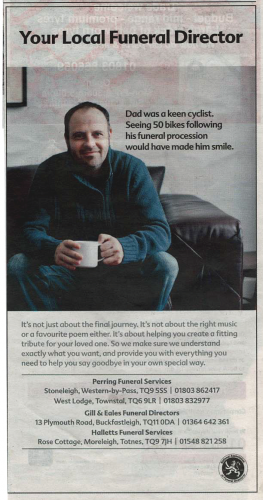Archive: 24 October 2013
What to say when someone’s history?
The job of the life-centred funeral is clear enough. It serves two purposes: first, to meditate on the now-complete life lived; second, to spell out all that has not been lost. While the dead person will no longer be an active presence in the mourners’ lives, their example will continue to be influential, and memories of them will continue to give pleasure — after a period of grieving when those memories are likely to give more pain than pleasure.
At the heart of a life-centred funeral lies, therefore, the treatment of the life lived. The composition of this treatment calls for extraordinary craft skills by the eulogist, who must judiciously select what goes in and what doesn’t The audience hasn’t got all day. They know what they want to hear. They don’t want to hear all the stuff the person did, they want to hear about what made the person tick. This is best expressed through expertly crafted anecdotes which encapsulate ‘what oft was thought but ne’er so well expressed’. A good eulogist articulates and illuminates the essence of the dead person — brings them alive — and accomplishes all that in around 7 unhurried minutes. It’s one of the most difficult writing briefs in the known universe.
Not surprising, therefore, that it’s oft done so badly. The lazy or inept eulogist opts for the cop-out of a flat-lining chronological narrative — a story which can only end unhappily. Up and down the land today crematoria will sullenly resound with the bathetic words “Henry James Barnett was born on…”
For a celebrant too busy to think (there are far too many of these), this makes a funeral script easy enough to write on autopilot. They would defend themselves by saying that this is what the family told him or her. Not good enough, pal.
The size and quality of a person’s character is not necessarily in direct proportion to amount of stuff they did. For example, the lives of many people are not defined by the jobs they do. But in the case of a family for whom the funeral eulogy is the first draft of the official biography, the agreed (likely enough retouched) life story, what is the eulogist to do with all the stuff the family wants in, but which simply either won’t fit or won’t hold an audience?
The answer lies in the document produced at some expense but all-too-soon dropped in the bin as of no lasting value, namely, the service sheet or booklet. This is the place for the timeline, the start-to-finish life story with all the house moves and career shifts and professional achievements — the CV stuff.
Such a narrative would complement the words of the eulogy — and might even repeat some of them. There’d be no time to read it at the funeral, of course, so people would take it home and peruse it at leisure. It’d be of lasting value, so they’d be far less likely to guiltily slip it with the recycling. All at once the service booklet would start earning its keep.

